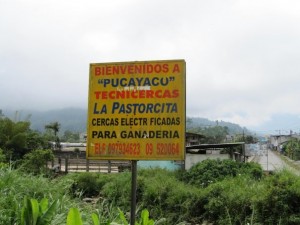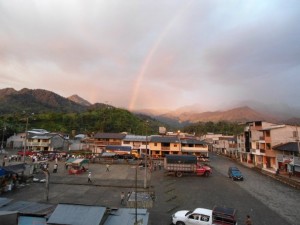I’ve never once run into someone in New York, someone that I know. It never, ever happens to me, not on the subway, not when I’m walking to the deli, never. And I’m out. I go running all the time. I ride my bike everywhere. I’m taking my dog for a walk at least twice a day. I know that I know people in New York. I know that people live by me in Astoria, Queens. My brother lives live five blocks away. My uncle, my sister-in-law, all within walking distance. A lot of my coworkers are really close. Yet I’ve never just happened upon anyone just walking around. How is this possible?
I know, there are like eight million people living in this city. Which is crazy. That’s a lot of people. It’s so many people. It’s enough people so that when I’m walking around, I’m constantly surrounded by lots and lots of people, everywhere. And it’s just insane, that really weird feeling of going about my day, walking around, seeing so many other human beings, everywhere, I can’t walk fast because the sidewalks are just jam packed with bodies, and I’m looking at everybody, at their faces, at what they’re doing, and I don’t know anyone, not even one person.
That’s a feeling that, I think, it has to be antithetical to our nature, as social animals. I walk past two people, three people, four people talking to each other, talking on their cell phones, I think, why am I not talking to anybody? Why isn’t anybody talking to me? I’m having a bad day, I’m stressing out about problems at work, problems at home, imaginary problems that I’m imagining up in my head, and I look up and I just see this wall of human activity, and I don’t have anything to do with it, with any of it. And I’m just like, is it even real? Does that even make sense?
I didn’t grow up a New Yorker; I grew up a Long Islander. But it wasn’t all that different. In fact, it was worse, because instead of walking around everywhere, everybody drives, and so instead of staring out at a world of strangers, I’d just be staring out at a world of cars, all driven by people, yeah, but everybody kind of hidden behind the reflections of their windows. Which is, again, it’s worse, because it takes a special someone to cut you off walking on the sidewalk. But in car? It’s all too common.
The only time I ever walked out of the house and ran into people that I knew was when I spent two years in the Peace Corps. I lived in a really small town called Pucayacu located in the subtropics of Ecuador. It wasn’t even a town really, but I hesitate to call it anything else, because all of the other English words available to describe societies smaller than towns evoke feelings and sentiments that aren’t really appropriate to what Pucayacu is, what it was while I was there.
In Spanish, Pucayacu isn’t a town, it’s a parroquia, which, translated to English is a parish, which is misleading, because a parroquia in Ecuador doesn’t have anything to do with religion. The parroquia itself was broken down into twelve or so recintos, a word that, until now, I’ve never felt the need to translate, but Google Translate is telling me that it means “enclosure.” So imagine smaller than a town, and then even one level smaller than that.
It was the exact opposite of what it’s like here in New York; I’d step out of my house and I’d know absolutely every single person that I ran into. And they’d all say hi to me, “Buenos días Don Roberto! Como le va? Como ha pasado?” every single person, every single time. There was only one road in and out of town, and so imagine what it was like trying to make it to the end of the road to head out for a run. Or just to buy a soda from the señora who sold groceries out of her kitchen. “Hola Roberto!” every time, everybody inviting me in for some snacks, for some coffee, for a second or third lunch, to sit with their families in front of their houses for a while, to ask me questions about the United States or, when those questions got old, to tell me at length about Ecuador, about their lives, about their families, and why don’t you spend the evening over here? Have dinner with us, come on, you can help our kids with their homework, and come out to the farm with us tomorrow, we’ll show you the animals, the plantains, we’ll go swimming in the river and drink beers in the afternoon.
Sometimes it was all too much. I’d just want to be left alone. I didn’t want to have to make up words to “Hotel California,” pretending to sing a convincing American hit every time somebody brought out a guitar. Once in a while I really did just want to walk to the end of the road and go for a really long run, without stopping every time I’d pass somebody on the side of the road waiting for a pickup truck, explaining that I’m not running from anything, that I’m exercising, that I’m working out, declining rides from every car and bus that stopped along the way, “Hey Roberto, what are you doing? Hop in, we’ll take you back!”
But here I am, back in New York, I’ve been back from Ecuador now for almost as long as I was there. And I walk out of my house, and I jockey for a spot on the sidewalk, to keep my head down and shuffle along like everybody else, no eye contact, nobody saying hi, nobody knows who I am. And I think about all of this and it’s like, the grass really was greener over there. Everything was greener over there. The butterflies were neon-bluer over there. The sunsets were alive, the stars at night exactly like you’d imagine them to be. Everything was bursting with color, exploding with life; it was a world away from where I’m from yet somehow it was more intimate, intense, familiar.

